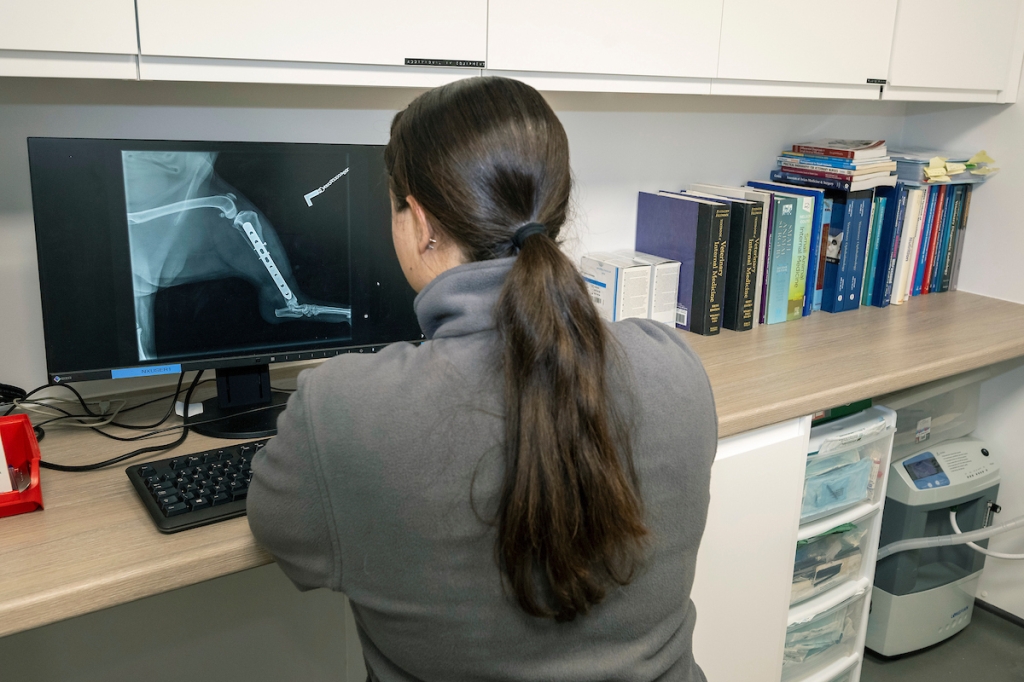
Veterinary surgeon looking at an x-ray on a computer screen
New CVS’ Study On Radiographic Examination Changes Systematic Patient Follow-up
A new study has been conducted by Surgery Resident Dr Charlie Brincin at Highcroft Veterinary Group[i] and Orthopaedic Surgeon Dr Matt Matiasovic at Manchester Vet Specialists which has resulted in both referrals hospitals changing their systematic follow-up routines.
The study determined whether radiographic examination, performed at the time of planned re-evaluation after medial patellar luxation (MPL) surgery in dogs, had an influence on the post-operative recommendations made by the clinician.
The findings demonstrated that if the dog made an uneventful[ii] recovery after surgery, was presented without owner concern, and if no abnormality was found on physical examination, then radiographic findings only led to a change in recommendation in 3% (13/432) of these dogs.
This reflects similar research on the influence of follow-up radiographs in human medicine, and those of previous veterinary studies on post-operative radiographs, following uncomplicated tibial plateau leveling osteotomy (TPLO). These particular studies[iii] [iv] showed radiography had an impact on post-operative management in just 2%-3.8% of cases.
As a result of the MPL and TPLO studies, Highcroft Veterinary Referrals and Manchester Veterinary Specialists will no longer systematically perform follow-up radiographs on their patients, unless justified clinically.
Dr Charlie Brincin, Surgery Resident at Highcroft Veterinary Referrals, said:“Radiographs are not without additional costs or risks - including radiation exposure, sedation-associated risks and strain on veterinary staff. Radiographic intervention should be clinically justified. And our study suggests that if the dog had an uneventful recovery and is presented without owner or clinician raised concern, then repeat radiographs might not be necessary. This study also highlights the value of a thorough owner history and clinical examination for clinical decision-making when re-examining dogs following this orthopaedic surgery.”
The MPL study also evaluated factors which significantly increased the risk of finding radiographic abnormalities at routine follow-up, and those which led to a change in post-operative recommendation. Lameness, administration of analgesia at follow-up, and history of unplanned visits prior to routine re-examination were associated with increased odds of a change in postoperative plan (P < 0.001). In the absence of owner and clinician concerns, the odds of having a change in convalescence plans were not different, whether or not isolated radiographic abnormalities were present (P = 0.641).
The Highcroft and Manchester Vet Specialists study collected data from 825 cases retrospectively, from 10 referral centers. It investigated if these dogs had a change in post-operative management made at their follow-up appointments, and the factors that had influenced this decision - such as unplanned visits prior to the routine follow-up, lameness, owner-raised concern, abnormal clinical findings or radiographic abnormality. The study also analysed the nature of the changes made in follow-up, including prolongation of exercise restriction, additional re-examination or surgery.
The value of routine radiographic follow up in the postoperative management of canine medial patellar luxation study has been published in the journal Veterinary Surgery https://onlinelibrary.wiley.com/doi/abs/10.1111/vsu.13933 .
CVS Group operates across small animal, farm animal, equine, laboratories and crematoria, with over 500 veterinary practices, referral centres and sites in the UK, the Republic of Ireland and the Netherlands. In the last five years the company has invested nearly £80 million in its sites, facilities and equipment, in addition to industry leading training and support, to give the best possible care to animals.
[i] Soon to be Bristol Vet Specialists.
[ii] The recovery was defined as uneventful where there was no evidence of unplanned attendance to the referring practice or referral institution between postoperative discharge and the scheduled routine follow up and there was no record of complications in the clinical records.
[iii] Alexander A, Compagnone K, Grierson J, et al. Influence of radiographic examination findings on recommendations made during routine clinical re-evaluation of dogs with uncomplicated tibial plateau leveling osteotomy. Vet Surg. 2021;50(1): 44-52.
[iv] Olivencia-Morell PJ, Frederick SW, Forbes JN, Cross AR. Evaluation of the clinical value of routine radiographic examination during convalescence for tibial plateau-leveling osteotomy. Vet Surg. 2021;50(8):1644-1649.
More from CVS UK Ltd
- Chestergates Veterinary Specialists launches Specialist Dermatology Service
- CVS launches Life Stage Assessment Clinical Improvement Project to champion pet wellness
- Chestergates Veterinary Specialists strengthens surgical team with appointment of Specialist Matthew Smith
- Precise imaging and unconventional fixation resolve challenging tarsal fracture
- CVS Farm Vets launches innovative Sheep Lameness Project to support UK farmers

 3 years ago
3 years ago  1143 views
1143 views